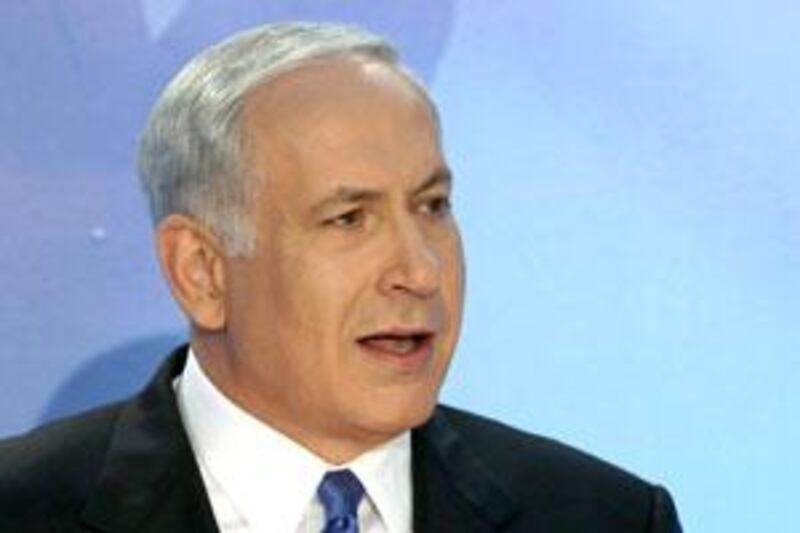TEL AVIV // Under US pressure, Benjamin Netanyahu appeared to have shifted closer to the centre of Israel's political map this week after the premier finally reversed his years-long opposition to the creation of a future Palestinian state. But the controversial conditions Mr Netanyahu has set for his acquiescence to the establishment of such a state spurred much scepticism yesterday about whether the two-state accord would see the light of day during his four-year premiership. In a keenly anticipated speech on Sunday night, Mr Netanyahu endorsed a Palestinian state as long as it did not have an army, controlled its own airspace or was allowed to strike military alliances. He also insisted Israel retain sovereignty over all of Jerusalem, a position rejected by Palestinians, who want east Jerusalem as their future capital. Furthermore, he stated that he would continue expanding existing settlements in the occupied West Bank and demanded that Palestinians forego the right of return for refugees. Ghassan Khatib, the Palestinian co-editor of bitterlemons.org, a website devoted to Israeli-Palestinian dialogue, said such conditions made the emergence of a Palestinian state "impossible". "His conditions would not make this entity a state - how can the borders of a state be controlled by another state? This speech is bad news for the American peace efforts at ending the conflict." Indeed, Mr Netanyahu's address drew criticism throughout the Arab world. A spokesman for Mahmoud Abbas, the president of the western-backed Palestinian Authority, which holds sway in the West Bank, condemned the statements as "sabotaging" peace efforts. The foreign ministry of Egypt, one of only two Arab states - along with Jordan - which is at peace with Israel, called the premier's vision "flawed". In Syria, the mass-circulation Al Watan said Mr Netanyahu's speech "torpedoes all peace efforts" while Al Baath, the mouthpiece of Syria's ruling party, wrote that the prime minister "confirmed" his rejection of Arab states' peace efforts with Israel. In Jordan, the pro-government Al Rai daily headlined an editorial: "Netanyahu offered rotten merchandise. Nobody will buy it." In Saudi Arabia, the state-run Al Nadwa daily wrote: "Every paragraph of Netanyahu's speech makes us more pessimistic." Analysts said that instead of drawing Palestinians back to the negotiations' table, Mr Netanyahu seemed to aim his speech at mitigating pressure from Washington and the European Union while appeasing his right-wing coalition allies at home. That tactic may have yielded some success. In the European Union, where some top officials have recently hinged an upgrade of bilateral ties with Israel on its new government's acceptance of Palestinian statehood, the Czech foreign minister, Jan Kohout, called Mr Netanyahu's statements a "step in the right direction". But the Finnish foreign minister, Alexander Stubb, when asked if the Israeli premier's speech was enough to upgrade ties with the EU, said: "No." Several other foreign ministers questioned Mr Netanyahu's stance on divisive issues, such as settlements and the fate of Jerusalem. The White House welcomed the speech as an "important step forward". However, it remained silent on a key demand by Barack Obama, the US president, which went unheeded by Mr Netanyahu - namely, a freeze on settlement construction in the West Bank, territory Palestinians want for their future state along with the Gaza Strip and east Jerusalem. In his address, the premier made no mention of removing any Jewish communities from occupied Palestinian land and said construction would not be halted. Yesterday, in an interview with the US channel NBC, he stated: "I think that President Obama and I are trying to reach a common understanding on this." Israeli analysts said Mr Netanyahu - like his predecessors, including those from the centre-left Labor party - was seeking ways of keeping the powerful settler groups satisfied even as he accepted a future Palestinian state, which the settlers fiercely reject. "Ultimately, keeping the settlers happy means the spread of settlements and reduces the Palestinian motivation for a two-state solution," said Yossi Alpher, a prominent Israeli commentator. He added: "Obama has grasped this, which is why he insists on zero growth. It will be interesting to see whether he stands his ground even at the risk of causing a political crisis in Israel, which could ultimately elections that produce the same kind of government." For the time being, Mr Netanyahu appears to have clinched his survival in Israel's tumultuous political world. His list of constraints for the establishment of a Palestinian state kept any potential opposition within his predominantly right-wing coalition muted yesterday. His conditional support for Palestinian statehood is also likely to appeal to many Israeli Jewish voters, who - according to polls published in recent years - have consistently backed the two-state solution by a small majority. vbekker@thenational.ae
Netanyahu's conditions give rise to scepticism
The Israeli prime minister's speech gives the impression he is shifting towards the centre, but critics say it is just political manoeuvering.

Editor's picks
More from the national




